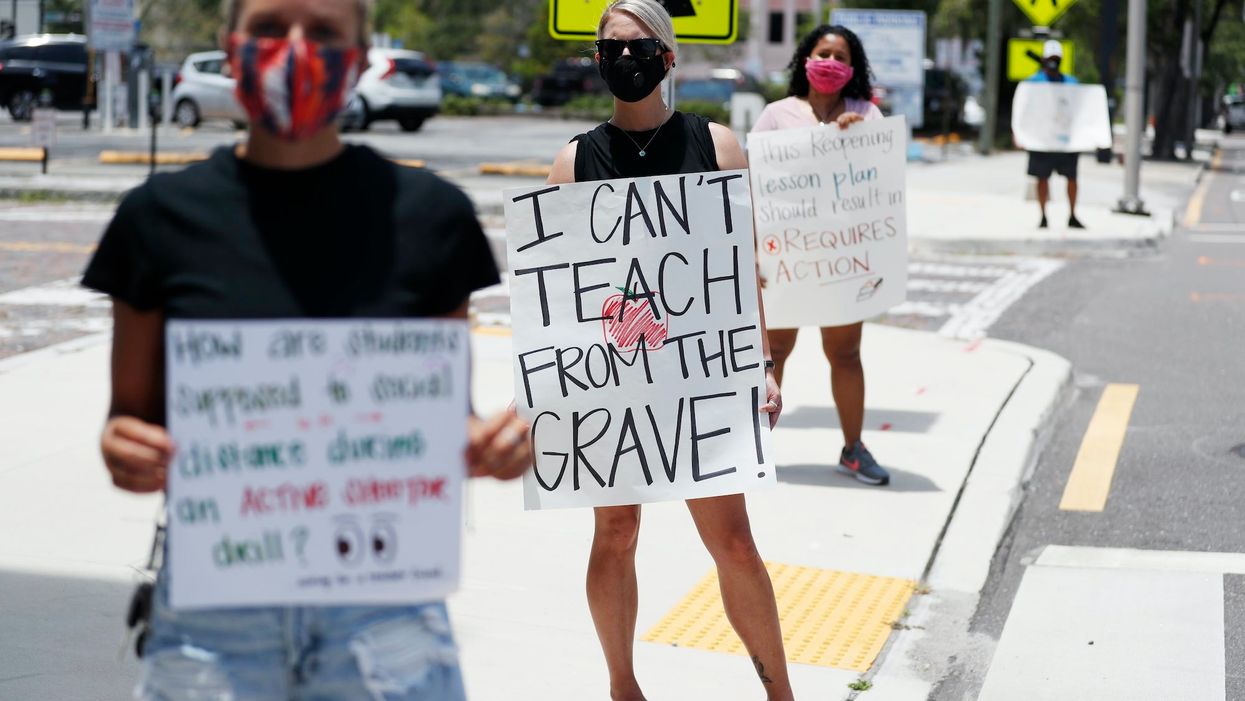
Photo by Octavio Jones/Getty Images

If nurses and grocery store clerks are 'essential,' then so are teachers
States and school districts around the country are debating what to do about opening schools this fall. Some teachers and their unions are threatening to strike if forced to go back to work earlier than they believe is safe.
The ongoing fight is prompting parents, policymakers, and observers to ask: Aren't teachers essential workers?
That position was laid out in an op-ed in The Atlantic on Tuesday by Kristen McConnell, a New York nurse and writer.
McConnell's "I'm a Nurse in New York. Teachers Should Do Their Jobs, Just Like I Did." piece demanded to know why teachers should not have to go back to work at the very schools our government — and the teachers from those schools — have long claimed are essential to keeping our society functioning.
She began by noting that her husband is a New York City public-school teacher who is adamantly against a teacher strike and "understands on a deep, personal level his duty to serve his country in the classroom." He knows, McConnell wrote, that she, as a nurse caring for COVID-19 victims, had a role fill for the nation's well-being and that he also has a similar role to play:
We have two young children, one of whom is developmentally disabled, and I'm an intensive-care nurse. Through the spring, I took care of COVID-19 patients at the hospital while he toggled between teaching on Zoom and helping our daughters through their own lessons. He knows that I did my part for society, and that now he should, too.
McConnell went on to explain that she supports teacher-led efforts to make sure safety measures are put in place by the districts and that states or cities with spikes in cases should keep schools closed for now — along with indoor businesses. But what she refuses to support, she said, is making threats to hold "safety strikes" the way the American Federation of Teachers did last week.
According to McConnell, the strike threats "run counter to the fact that, by and large, school districts are already fine-tuning social-distancing measures and mandating mask-wearing." These measures, she noted, are effective — which is why she and her fellow nurses practice them daily.
Then she noted that teachers have an obligation to "rise to the occasion even if it makes them nervous, just like health-care workers have":
Instead of taking the summer to hone arguments against returning to the classroom, administrators and teachers should be thinking about how they can best support children and their families through a turbulent time. Schools are essential to the functioning of our society, and that makes teachers essential workers. They should rise to the occasion even if it makes them nervous, just like health-care workers have.
My husband, playing devil's advocate while we discussed this (we both know how eager he is to go back), said, “Arguably health-care workers sort of signed up for this kind of risk, but teachers did not."
I replied, “Absolutely not!" Doctors and nurses sign up for work that is sometimes high-stress for us and sometimes life-or-death for our patients, not for us. Aside from those who choose to work in biocontainment or offer their services in war zones, we are not expected to do crucial medical work under potentially lethal circumstances.
Knowing that many defenders of teachers who refuse to return to work would surely argue that nurses and teachers are fundamentally different on the essentiality scale, McConnell noted that the country is essentially at war and the people in positions that keep our society in tact are needed at the front lines.
"This was a war, and I was a soldier," she said, then remembering when the pandemic first started. "It wasn't my choice to serve, but it was my duty; I had skills and knowledge that were needed."
Besides, she added, if grocery store clerks are "essential," certainly teachers are, too:
So I can understand that teachers are nervous about returning to school. But they should take a cue from their fellow essential workers and do their job. Even people who think there's a fundamental difference between a nurse and a teacher in a pandemic must realize that there isn't one between a grocery-store worker and a teacher, in terms of obligation. People who work at grocery stores in no way signed up to expose themselves to disease, but we expected them to go to work, and they did. If they had not, society would have collapsed. What do teachers think will happen if working parents cannot send their children to school? Life as we know it simply will not go on.
She concluded her piece with an encouragement for teachers who are concerned that maybe they don't have what it takes — a feeling she had when COVID-19 reared its ugly head: "I knew I wouldn't fail — the skills I had were the very reason I had been called upon to do this work. The same is true of teaching through a pandemic."